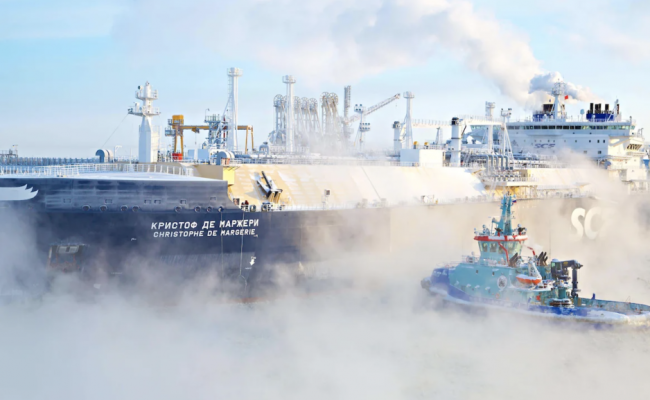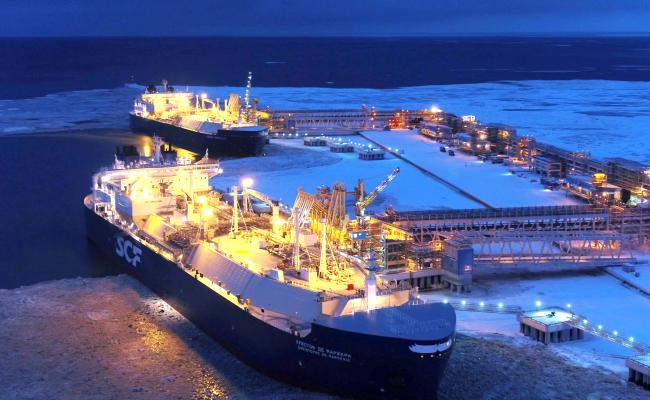French Shipyard Halts Service for Russian LNG Fleet, Leaving Danish Yard as Sole Western Provider
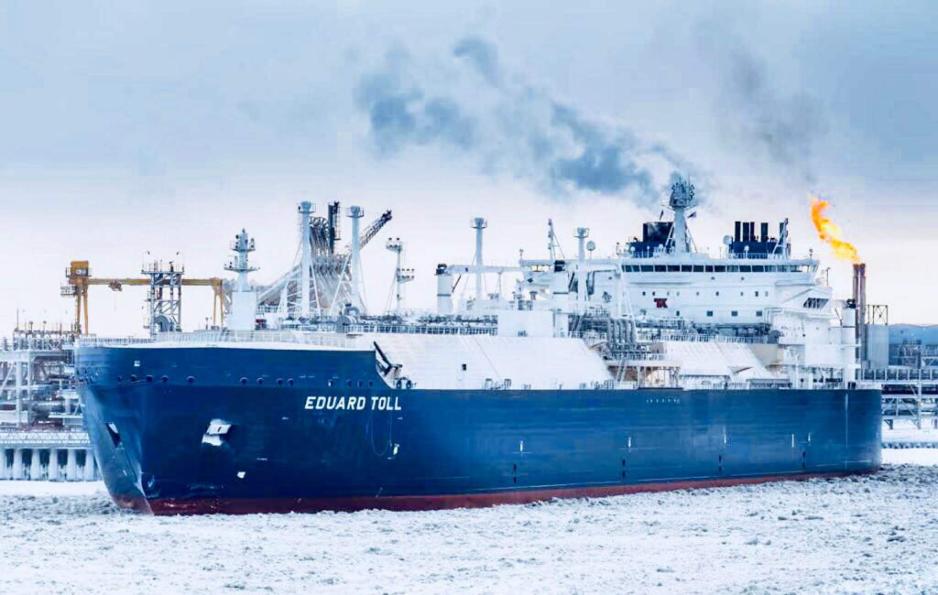
It is unclear if another shipyard in northern or western Europe offers this type of hull maintenance with facilities large enough to accommodate the massive Arc7 LNG carriers.
A French shipyard’s decision to stop servicing Russian liquefied natural gas vessels isolates the country’s Arctic fleet, shifts maintenance burden to Danish yard. The move further tightens logistical constraints on Moscow’s exports ahead of broader planned EU sanctions to fully phase out Russian gas imports.
A major French shipyard has stopped providing maintenance work for Russian liquefied natural gas (LNG) carriers. The decision could further complicate Russia’s ability to export super-cooled gas from the Arctic to markets in Europe and Asia.
The move leaves a Danish yard as the only remaining Western facility currently servicing the Kremlin’s Arctic fleet amid tightening European scrutiny.
Russia relies on a small number of specialized LNG tankers—many built with Western technology—to transport gas from the Arctic to Europe and Asia. While the vessels are not directly sanctioned, increasing scrutiny on indirect support has complicated their global operations.
15 vessels
Two European shipyards, Damen Shiprepair in Brest, France and Fayard A/S in Odense, Denmark have played a key role in keeping this fleet of fifteen vessels afloat. Since the beginning of the full-scale invasion in February 2022 the two yards serviced all but one vessel of the Yamal LNG fleet, with a number of vessels making repeat visits, a HNN investigation revealed last year.
Between February 2022 and July 2024 the Brest shipyard welcomed at least eight LNG carriers chartered to Novatek’s Yamal LNG project. But it has now ceased maintenance work on these vessels.
The company made this decision in line with Dutch foreign policy
“Although repairs to this type of ship have been carried out in the past, the decision has been made (beginning of 2025) to no longer carry out these repairs. Although the previous repairs were permitted under European sanctions legislation, we decided to refrain from further work on this type of ship,” said Robin Middel, a spokesperson for the Dutch parent company Damen.
“The company made this (own) decision in line with Dutch foreign policy, discouraging Dutch companies from undertaking this type of work supporting Russian LNG export,” he continued.
Key for Arctic fleet
Damen’s decision will further complicate the logistic surrounding the Yamal LNG project, though a Danish shipyard may be able to absorb some of the work previously done in France.
Damen’s Brest facility specializes in hull repairs, critical for vessels operating in the harsh Arctic environment routinely breaking a path through thick sea ice.
It is unclear if another shipyard in northern or western Europe offers this type of hull maintenance with facilities large enough to accommodate the massive Arc7 LNG carriers.
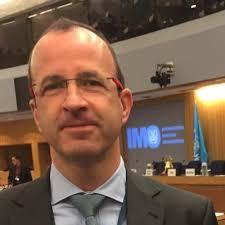
Hervé Baudu, Arctic shipping expert and Chief Professor of Maritime Education at the French Maritime Academy (ENSM). (Photo: Private)
“Yes, strictly speaking there are other shipyards in Europe e.g. in Spain or France that would have the capacity to accommodate them, however, their workload is devoted to new construction rather than repairs or inspections,” says Hervé Baudu, Arctic shipping expert and Chief Professor of Maritime Education at the French Maritime Academy (ENSM).
“Their schedules are likely not compatible with the Arc7 LNG carriers’ needs as they mainly build new ships and only occasionally carry out specific installations planned well in advance,” he continued.
Only Danish yard remains
Aside from Damen’s facility, Danish shipyard Fayard A/S has been a key service provider over the past several years. The Odense-based facility has welcomed seven out of fifteen LNG carriers since 2022. Fayard A/S has not announced any changes to its operation.
It continues to provide its services to Russian LNG carriers. This summer the yard has already seen visits from at least two vessels. Nikolay Urvantsev arrived at the drydock on June 25, followed by Fedor Litke on July 17.
It is unclear if Fayard has the capacity to fully absorb work previously carried out by Damen.
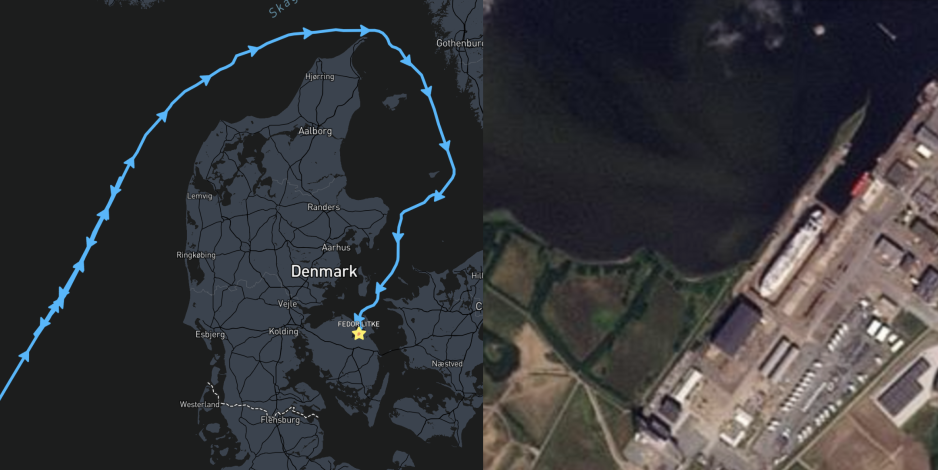
AIS track and satellite image of LNG carrier Fedor Litke at the Fayard yard on August 4, 2025. (Source: Sentinel 2)
When reached for comment by HNN, the company referred to the EU’s plans with respect to phasing out Russian LNG.
“We do not wish to comment on what tasks other companies/yards prioritize. However, Fayard fully supports Denmark and the EU’s stance towards Russia,” a company spokesperson told HNN.
“We support the EU’s plans and adhere to the current political guidelines and regulations, as we are interested in assisting the EU, and consequently we work in accordance with what the EU’s politicians decide,” the company continued in an emailed statement.
Fayard highlighted that based on current EU policy Russian LNG was still needed for the continent’s energy security.
“As we understand, the EU aims to phase out Russian LNG/natural gas, but has assessed that natural gas from the Yamal LNG facility remains a necessary part of Europe's energy supply. Accordingly, this is not sanctioned in the 18th and latest sanctions package from the EU, which was adopted by the end of July 2025,” the statement concluded.
Also read (the text continues)
Asian shipyards to the rescue
With Damen’s Brest facility no longer available, vessels operators may be relying more heavily on yards outside the EU, especially in Asia.
“The consequences could result in operating losses, as the ships will probably be forced to go to Chinese shipyards,” explains Baudu.
Currently several sanctioned LNG carriers are undergoing lengthy yard visits in Eastern China. Sputnik Energy has spent weeks at a Zhousan-based yard near Shanghai. Another gas carrier, Nova Energy, called at a neighboring shipyard.
Last year a sanctioned Yamal LNG carrier remained at the Zhoushan yard for close to two months.
These detours mean the vessels will make fewer trips, carry less gas, and make less money for Russian energy firm Novatek.
“The time spent in transit to the shipyard and the vessel’s immobilisation will mean fewer transits for Novatek's cargoes from Yamal LNG. The companies attached to Yamal LNG are paid on an annual basis, regardless of the number of voyages made. The loss is therefore directly attributable to Novatek's profits,” explains Baudu.
Damen’s decision to step away from providing its service to the vessels aligns with broader European efforts to fully phase out the purchase of Russian liquefied natural gas by the end of 2027.
The European Commission is currently in negotiations with member states to disallow short-term sales by the end of 2025 with imports under long-term contracts to end before 2028.
Novatek did not respond to requests for comment if Damen’s decision will affect its operations or maintenance intervals.


